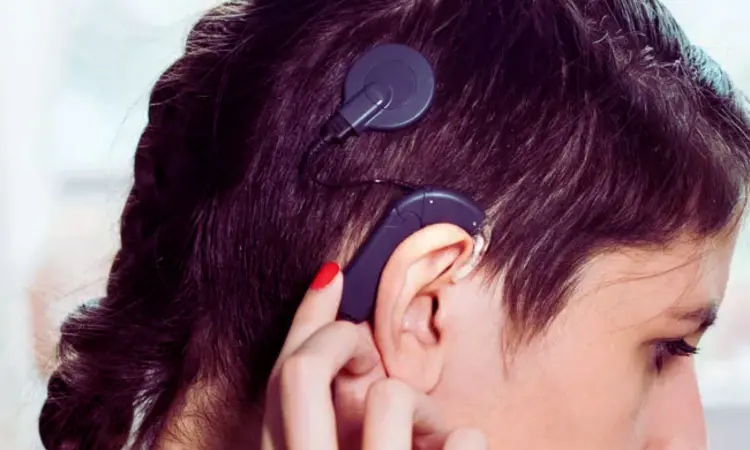- Home
- Medical news & Guidelines
- Anesthesiology
- Cardiology and CTVS
- Critical Care
- Dentistry
- Dermatology
- Diabetes and Endocrinology
- ENT
- Gastroenterology
- Medicine
- Nephrology
- Neurology
- Obstretics-Gynaecology
- Oncology
- Ophthalmology
- Orthopaedics
- Pediatrics-Neonatology
- Psychiatry
- Pulmonology
- Radiology
- Surgery
- Urology
- Laboratory Medicine
- Diet
- Nursing
- Paramedical
- Physiotherapy
- Health news
- Fact Check
- Bone Health Fact Check
- Brain Health Fact Check
- Cancer Related Fact Check
- Child Care Fact Check
- Dental and oral health fact check
- Diabetes and metabolic health fact check
- Diet and Nutrition Fact Check
- Eye and ENT Care Fact Check
- Fitness fact check
- Gut health fact check
- Heart health fact check
- Kidney health fact check
- Medical education fact check
- Men's health fact check
- Respiratory fact check
- Skin and hair care fact check
- Vaccine and Immunization fact check
- Women's health fact check
- AYUSH
- State News
- Andaman and Nicobar Islands
- Andhra Pradesh
- Arunachal Pradesh
- Assam
- Bihar
- Chandigarh
- Chattisgarh
- Dadra and Nagar Haveli
- Daman and Diu
- Delhi
- Goa
- Gujarat
- Haryana
- Himachal Pradesh
- Jammu & Kashmir
- Jharkhand
- Karnataka
- Kerala
- Ladakh
- Lakshadweep
- Madhya Pradesh
- Maharashtra
- Manipur
- Meghalaya
- Mizoram
- Nagaland
- Odisha
- Puducherry
- Punjab
- Rajasthan
- Sikkim
- Tamil Nadu
- Telangana
- Tripura
- Uttar Pradesh
- Uttrakhand
- West Bengal
- Medical Education
- Industry
Gene Therapy Outperforms Cochlear Implants in Hearing and Speech Outcomes for Congenital Deafness: JAMA Study

China: Researchers have found in a new study conducted in China that children with congenital deafness who received gene therapy demonstrated more stable and rapid improvements in hearing, speech performance, speech-in-noise recognition, and music perception compared to those treated with cochlear implants.
The cohort study, recently published in JAMA Neurology, was conducted by Xiaoting Cheng and colleagues from the ENT Institute and Department of Otorhinolaryngology at the Eye and ENT Hospital, Fudan University, Shanghai. It evaluated the effectiveness of gene therapy targeting the OTOF gene compared to the current gold standard, cochlear implantation (CI), in children born with severe to profound hearing loss.
The study included 72 participants between 1 and 18 years of age who either underwent gene therapy (GT) or received cochlear implants. Of the screened 1,568 individuals, 11 children were enrolled in the GT group, while 61 received cochlear implants. All participants were matched based on duration of deafness and pre-treatment hearing and speech abilities.
The study led to the following findings:
- At the 12-month mark, both gene therapy (GT) and cochlear implant (CI) groups showed similar levels of hearing and speech performance.
- GT patients showed faster recovery and earlier improvements compared to the CI group.
- At 6 months post-treatment, GT patients had higher median scores on the Infant-Toddler Meaningful Auditory Integration Scale (IT-MAIS) (31.0 vs 23.5).
- By 12 months, GT patients continued to outperform CI patients on the IT-MAIS, with median scores of 32.0 vs 28.0.
- Auditory brainstem responses in GT patients showed significant improvement, with nine individuals’ hearing thresholds improving from above 95 dB to an average of 54.8 dB.
- Mismatch negativity (MMN) testing indicated faster auditory information processing in GT patients at both 6 and 12 months.
- In bimodal therapy patients (GT in one ear, CI in the other), GT outperformed CI in recognizing speech in noisy environments at 12 months.
- Bimodal therapy patients also showed better in-tune singing rates than those with bilateral cochlear implants.
- MMN latencies were shorter in bimodal therapy patients compared to those with bilateral cochlear implants, indicating faster neural processing.
While the results are promising, the researchers noted some limitations. The sample size was relatively small, and objective testing was not feasible in all younger participants. Furthermore, while GT patients underwent continuous follow-up from baseline to one year, CI data were collected at a single time point, which limited comparability. The therapy also specifically targets DFNB9 hearing loss linked to OTOF gene mutations, suggesting that its effectiveness may vary with different genetic causes.
Despite these challenges, the study provides the longest prospective follow-up data to date on gene therapy for congenital deafness and is the first direct comparison between GT and CI. According to the authors, gene therapy could soon become the preferred option for individuals with OTOF-related congenital hearing loss due to its rapid and multidimensional benefits in hearing and speech development.
Reference:
Cheng X, Zhong J, Zhang J, et al. Gene Therapy vs Cochlear Implantation in Restoring Hearing Function and Speech Perception for Individuals With Congenital Deafness. JAMA Neurol. Published online July 21, 2025. doi:10.1001/jamaneurol.2025.2053
Dr Kamal Kant Kohli-MBBS, DTCD- a chest specialist with more than 30 years of practice and a flair for writing clinical articles, Dr Kamal Kant Kohli joined Medical Dialogues as a Chief Editor of Medical News. Besides writing articles, as an editor, he proofreads and verifies all the medical content published on Medical Dialogues including those coming from journals, studies,medical conferences,guidelines etc. Email: drkohli@medicaldialogues.in. Contact no. 011-43720751


